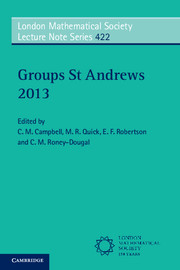Book contents
- Frontmatter
- Contents
- INTRODUCTION
- Approximate subgroups and super-strong approximation
- Width questions for finite simple groups
- Profinite properties of discrete groups
- GL(n, Z), Out(Fn) and everything in between: automorphism groups of RAAGs
- Permutation groups and transformation semigroups: results and problems
- New progress on factorized groups and subgroup permutability
- A survey on the normalizer problem for integral group rings
- A survey on Clifford-Fischer theory
- A generalisation on the solvability of finite groups with three class sizes for normal subgroups
- Automorphism groups of non-orientable Riemann surfaces
- What are the C2-groups?
- Resurrecting Wells’ exact sequence and Buckley's group action
- Recent work on Beauville surfaces, structures and groups
- Something for nothing: some consequences of the solution of the Tarski problems
- The groups of projectivities in finite planes
- On the relation gap and relation lifting problem
- Some results on products of finite subsets in groups
- Formal languages and group theory
- On the Castelnuovo-Mumford regularity of the cohomology of fusion systems and of the Hochschild cohomology of block algebras
- Recent advances on torsion subgroups of integral group rings
- On finite groups with small prime spectrum
- Solvability criteria for finite loops and groups
- The rational subset membership problem for groups: a survey
- A survey of Milnor laws
- Capable p-groups
- On the normal structure of a finite group with restrictions on the maximal subgroups
- Certain monomial characters and their normal constituents
- Recognition of finite quasi-simple groups by the degrees of their irreducible representations
- Generalized Baumslag-Solitar groups: a survey of recent progress
- Zeta functions of groups and rings – recent developments
New progress on factorized groups and subgroup permutability
Published online by Cambridge University Press: 05 September 2015
- Frontmatter
- Contents
- INTRODUCTION
- Approximate subgroups and super-strong approximation
- Width questions for finite simple groups
- Profinite properties of discrete groups
- GL(n, Z), Out(Fn) and everything in between: automorphism groups of RAAGs
- Permutation groups and transformation semigroups: results and problems
- New progress on factorized groups and subgroup permutability
- A survey on the normalizer problem for integral group rings
- A survey on Clifford-Fischer theory
- A generalisation on the solvability of finite groups with three class sizes for normal subgroups
- Automorphism groups of non-orientable Riemann surfaces
- What are the C2-groups?
- Resurrecting Wells’ exact sequence and Buckley's group action
- Recent work on Beauville surfaces, structures and groups
- Something for nothing: some consequences of the solution of the Tarski problems
- The groups of projectivities in finite planes
- On the relation gap and relation lifting problem
- Some results on products of finite subsets in groups
- Formal languages and group theory
- On the Castelnuovo-Mumford regularity of the cohomology of fusion systems and of the Hochschild cohomology of block algebras
- Recent advances on torsion subgroups of integral group rings
- On finite groups with small prime spectrum
- Solvability criteria for finite loops and groups
- The rational subset membership problem for groups: a survey
- A survey of Milnor laws
- Capable p-groups
- On the normal structure of a finite group with restrictions on the maximal subgroups
- Certain monomial characters and their normal constituents
- Recognition of finite quasi-simple groups by the degrees of their irreducible representations
- Generalized Baumslag-Solitar groups: a survey of recent progress
- Zeta functions of groups and rings – recent developments
Summary
Abstract
The study of products of groups whose factors are linked by certain permutability conditions has been the subject of fruitful investigations by a good number of authors. A particular starting point was the interest in providing criteria for products of supersoluble groups to be supersoluble. We take further previous research on total and mutual permutability by considering significant weaker permutability hypotheses. The aim of this note is to report about new progress on structural properties of factorized groups within the considered topic. As a consequence, we discuss new attainments in the framework of formation theory.
Introduction
In this survey only finite groups are considered.
The study of groups factorized as the product of two subgroups has been the subject of considerable interest in recent years. One of the important questions dealing with this study is how the structure of the factors affects the structure of the whole group and vice versa. A natural approach to this problem is provided by the theory of classes of groups. In this context, the above question can be reformulated as when the belonging of the factors of a factorized group to a class of groups is transferred to the whole group and reciprocally. It is well known that the product of two normal supersoluble subgroups is not supersoluble, in general. Nevertheless, the class of all supersoluble groups U is closed under forming direct and central products. It seems then natural to consider factorized groups in which certain subgroups of the corresponding factors permute, in order to obtain new criteria of supersolubility. A starting point of this research can be located at M. Asaad and A. Shaalan's paper [6]. They considered factorized groups G = AB where A and B are supersoluble subgroups and, in particular, they proved that G is supersoluble under any of the following conditions:
(i) Every subgroup of A permutes with every subgroup of B.
(ii) A permutes with every subgroup of B, B permutes with every subgroup of A and, moreover, the derived subgroup G’ of G is a nilpotent group.
Products of groups whose factors satisfy condition (i) were called totally permutable products by R. Maier in [33], where he proved that a corresponding result remains valid when the saturated formation U of all supersoluble groups is replaced by any saturated formation containing U.
- Type
- Chapter
- Information
- Groups St Andrews 2013 , pp. 142 - 151Publisher: Cambridge University PressPrint publication year: 2015



